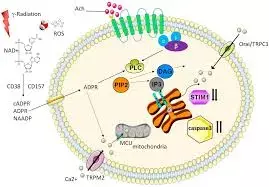- Home
- Medical news & Guidelines
- Anesthesiology
- Cardiology and CTVS
- Critical Care
- Dentistry
- Dermatology
- Diabetes and Endocrinology
- ENT
- Gastroenterology
- Medicine
- Nephrology
- Neurology
- Obstretics-Gynaecology
- Oncology
- Ophthalmology
- Orthopaedics
- Pediatrics-Neonatology
- Psychiatry
- Pulmonology
- Radiology
- Surgery
- Urology
- Laboratory Medicine
- Diet
- Nursing
- Paramedical
- Physiotherapy
- Health news
- Fact Check
- Bone Health Fact Check
- Brain Health Fact Check
- Cancer Related Fact Check
- Child Care Fact Check
- Dental and oral health fact check
- Diabetes and metabolic health fact check
- Diet and Nutrition Fact Check
- Eye and ENT Care Fact Check
- Fitness fact check
- Gut health fact check
- Heart health fact check
- Kidney health fact check
- Medical education fact check
- Men's health fact check
- Respiratory fact check
- Skin and hair care fact check
- Vaccine and Immunization fact check
- Women's health fact check
- AYUSH
- State News
- Andaman and Nicobar Islands
- Andhra Pradesh
- Arunachal Pradesh
- Assam
- Bihar
- Chandigarh
- Chattisgarh
- Dadra and Nagar Haveli
- Daman and Diu
- Delhi
- Goa
- Gujarat
- Haryana
- Himachal Pradesh
- Jammu & Kashmir
- Jharkhand
- Karnataka
- Kerala
- Ladakh
- Lakshadweep
- Madhya Pradesh
- Maharashtra
- Manipur
- Meghalaya
- Mizoram
- Nagaland
- Odisha
- Puducherry
- Punjab
- Rajasthan
- Sikkim
- Tamil Nadu
- Telangana
- Tripura
- Uttar Pradesh
- Uttrakhand
- West Bengal
- Medical Education
- Industry
Rapamycin enhances whole gland homeostasis and alleviates irradiation-induced parotid injury: Study

Rapamycin enhances whole gland homeostasis and alleviates irradiation-induced parotid injury suggests a study published in the Oral Diseases.
Salivary gland injury is one of the most common complications of radiotherapy in head-and-neck cancers.
This study investigated the mechanism by which rapamycin prevents irradiation (IR)-induced injury in the parotid glands. Miniature pigs either received (a) no treatment (NT), (b) IR in the right parotid gland for 5 consecutive days (IR), or intraperitoneal administration of rapamycin (Rap) 1 h prior to IR (IR + Rap). Tissues were collected at three distinct time points (24 h, 4 weeks, and 16 weeks) after IR. Histological analyses, western blot, and real-time reverse transcriptase-polymerase chain reaction were performed to explore the mechanisms of IR-induced injury in the parotid gland.
Results: Rapamycin treatment maintained parotid salivary flow 16 weeks post-IR, preserved the number of acinar cells, and reduced parotid tissue fibrosis, as well as reduced apoptosis levels, decreased cleaved caspase-3 expression, and increased the Bcl-2/Bax ratio in the parotid glands. Autophagy marker LC3B was upregulated by rapamycin after IR, while P62 expression was downregulated. Rapamycin reduced the expression of pro-inflammatory factors and the mesenchymal tissue fibrosis following IR. Rapamycin maintains gland homeostasis after IR by decreasing apoptosis, reducing the expression of pro-inflammatory factors, and enhancing autophagy.
Reference:
Zhu, Z., Song, J., Zhang, C., Zhang, J., & Shan, Z. (2024). Rapamycin alleviates irradiation-induced parotid injury by enhancing the whole gland homeostasis. Oral Diseases, 30, 5050–5061. https://doi.org/10.1111/odi.14948
Dr. Shravani Dali has completed her BDS from Pravara institute of medical sciences, loni. Following which she extensively worked in the healthcare sector for 2+ years. She has been actively involved in writing blogs in field of health and wellness. Currently she is pursuing her Masters of public health-health administration from Tata institute of social sciences. She can be contacted at editorial@medicaldialogues.in.
Dr Kamal Kant Kohli-MBBS, DTCD- a chest specialist with more than 30 years of practice and a flair for writing clinical articles, Dr Kamal Kant Kohli joined Medical Dialogues as a Chief Editor of Medical News. Besides writing articles, as an editor, he proofreads and verifies all the medical content published on Medical Dialogues including those coming from journals, studies,medical conferences,guidelines etc. Email: drkohli@medicaldialogues.in. Contact no. 011-43720751


